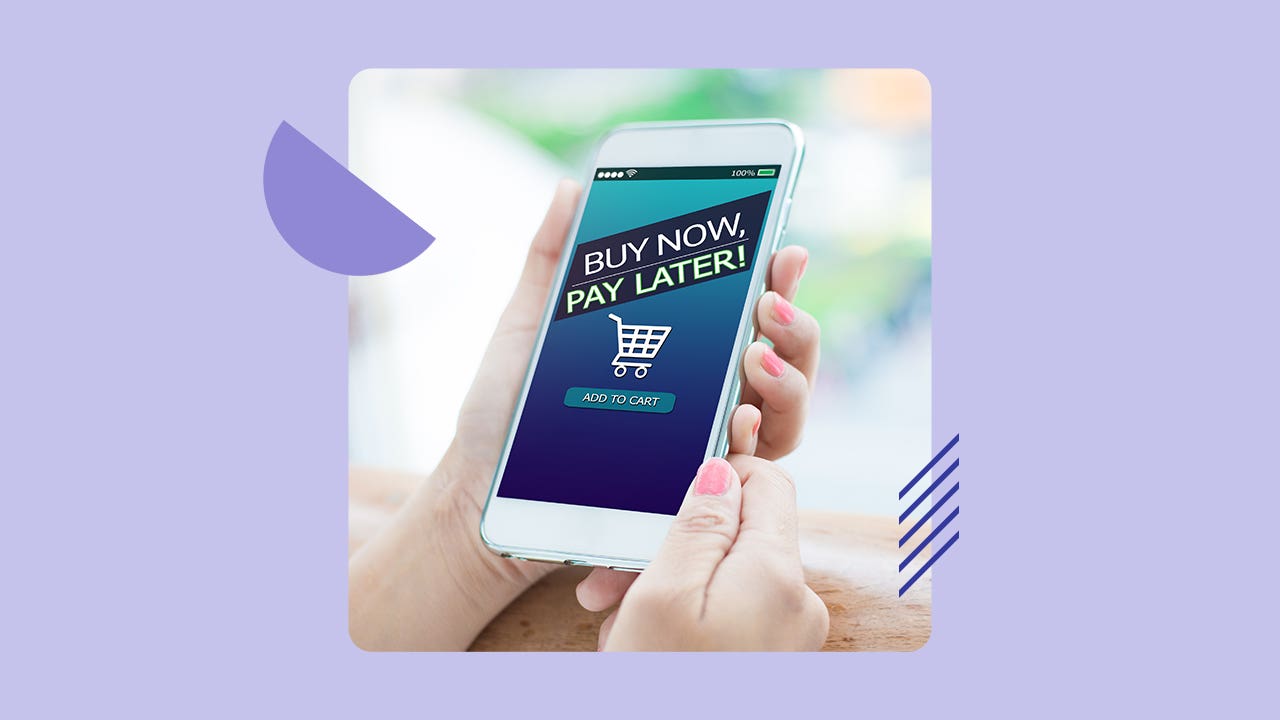Should your business use buy now, pay later financing?

Key takeaways
- Buy now, pay later is more popular with consumer purchases, but businesses may be able to use it for their own financing needs
- Buy now, pay later platforms offer short-term installment loans that are split into equal payments
- Using buy now, pay later loans can help you fund a purchase without depleting cash reserves all at once
Buy now, pay later (BNPL) financing has become popular among consumers in recent years. According to the CFPB, 17 percent of surveyed consumers with a credit history said they had used a BNPL plan in 2021.
While more popular with consumers, splitting up larger purchases as a small business can be beneficial, especially if you need new equipment or inventory fast and don’t want to spend your cash on hand. But should your small business use it? There are pros and cons to buy now, pay later financing, and short-term loans aren’t the right fit for every business. Keep reading to learn more about buy now, pay later and whether it’s a good option for your business’s financing needs.
What is buy now, pay later financing?
Buy now, pay later loans are just what they sound like: an opportunity to make a purchase without having to pay upfront. Many BNPL programs don’t charge interest, making them appealing to individuals and businesses who may have difficulty paying in full at the time of sale. They do, however, require payment to be made within a relatively short period of time. Buy now, pay later financing installment terms tend to last a few weeks to months.
Can businesses use buy now, pay later financing?
Yes, businesses are eligible for purchases using BNPL from many retailers. While the payment scheme is more known in the consumer space, there are some B2B opportunities for companies who need goods or services quickly. Similar to consumer purchases, businesses that use BNPL will need to pay their installments on time to stay in good standing with the financing company and avoid the possibility of their credit score being impacted.
Pros and cons of buy now, pay later financing for businesses
There are several potential advantages of using buy now, pay later financing for business expenses. But, using it also has some risks for a business. Before you make a purchase using this type of short-term credit, consider both the pros and cons.

Pros
- Keeps cash reserves untouched. By using a BNPL payment plan instead of your checking account, you can offset the effects of your purchase on your cash flow. Installment payments can free up more funds for day-to-day business.
- Minimizes fees and interest payments. Many buy now, pay later programs don’t charge interest or high fees. Paying this way could be cheaper than using a high-interest credit card or other short-term loan.
- Leaves other lines of credit open. If you already have a line of credit or business credit card, BNPL can still be a viable credit option. Choosing BNPL means you don’t have to add debt to other lines that may be reaching their limits.
- May help build credit. If the buy now, pay later lender reports to credit bureaus, making all installment payments on time could help boost your business credit score.

Cons
- Taking on new debt. While it only lasts for a few months and may not be reported to credit bureaus, a BNPL account will increase the debt of your company. Make sure you can afford to take it before submitting an application.
- Missed payments could affect business credit score. While a positive payment history could increase your credit score, missing a payment could have the opposite effect.
- Some BNPL plans require a hard pull on your credit report. Depending on the lender, your business’s credit report may experience a hard credit pull. This often results in a temporary reduction in your credit score.
Alternatives to buy now, pay later financing
If you need funding and buy now, pay later for small businesses is not the right fit, there are a lot of other options on the market.
- Small business loans. Small business loans from banks, credit unions and alternative lenders offer short- and long-term loans that can be used for most business expenses. Small business loans come with interest rates and often have origination or other fees, which can significantly increase the overall cost of the loan.
- Business credit cards. Business credit cards are a revolving line of credit. While they typically have lower limits than traditional loans or lines of credit, businesses won’t pay interest if the balance is paid in full every month.
- Merchant cash advances. When you apply for a merchant cash advance, the lender gives you a lump sum of money. Then, your company pays it back using future revenue from credit and debit cards. Companies that offer this service also collect a fee. It could be a good option if you need money due to seasonal fluctuations.
- Invoice financing. Invoice financing allows you to use accounts receivable as collateral for a loan. A lender will lend you money based on unpaid customer invoices, and then the customer pays the lender back as invoices get paid.
- Grants. Grants are free money from government or private sources. While you don’t have to repay them, grants take time to apply for and aren’t a good solution for immediate financial needs.
Bottom line
Buy now, pay later platforms offer a short-term lending opportunity that can be beneficial for businesses to free up cash flow or split up a larger purchase. But, if you need regular access to funds, it may make more sense to secure a small business loan or other type of business financing. As with any business financing, buy now, pay later has risks. Before using BNPL, make sure your business can afford the payments, as missing payments could impact your credit or the ability to secure additional financing in the future.
Frequently asked questions
-
Buy now, pay later financing could require a hard pull on your credit, which may temporarily lower your credit score. Missed or late payments also have the potential to hurt your credit profile. Because the terms are short, you must be confident that you can pay off the balance within a matter of weeks or months.
-
Some businesses offer buy now, pay later plans for B2B sales. This allows a business to buy goods and services without having to pay off the entire balance immediately. BackdPay by Backd is an example of B2B buy now, pay later.
-
Small businesses may use buy now, pay later to pay for an emergency expense or limit their use of other credit. Using BNPL also allows a business to make essential purchases without depleting their cash on hand.
Why we ask for feedback Your feedback helps us improve our content and services. It takes less than a minute to complete.
Your responses are anonymous and will only be used for improving our website.
You may also like

What is a merchant cash advance?

How to get a first-time business loan

When to consider semi-truck financing

Can businesses use personal loans?


